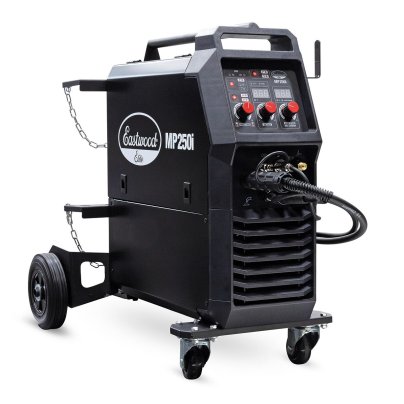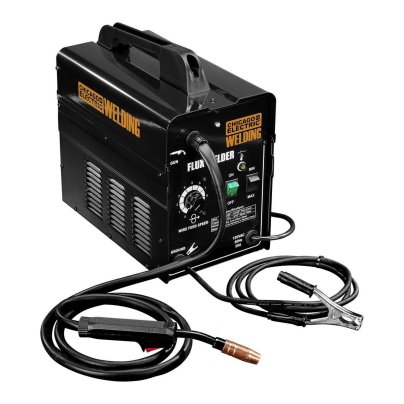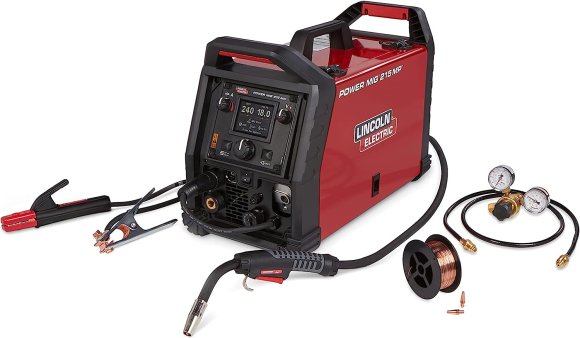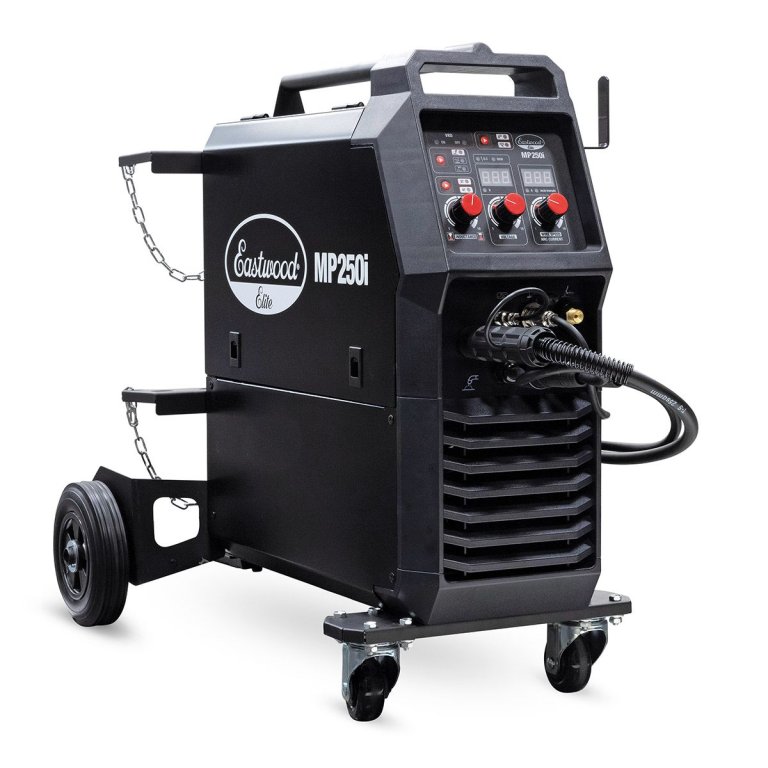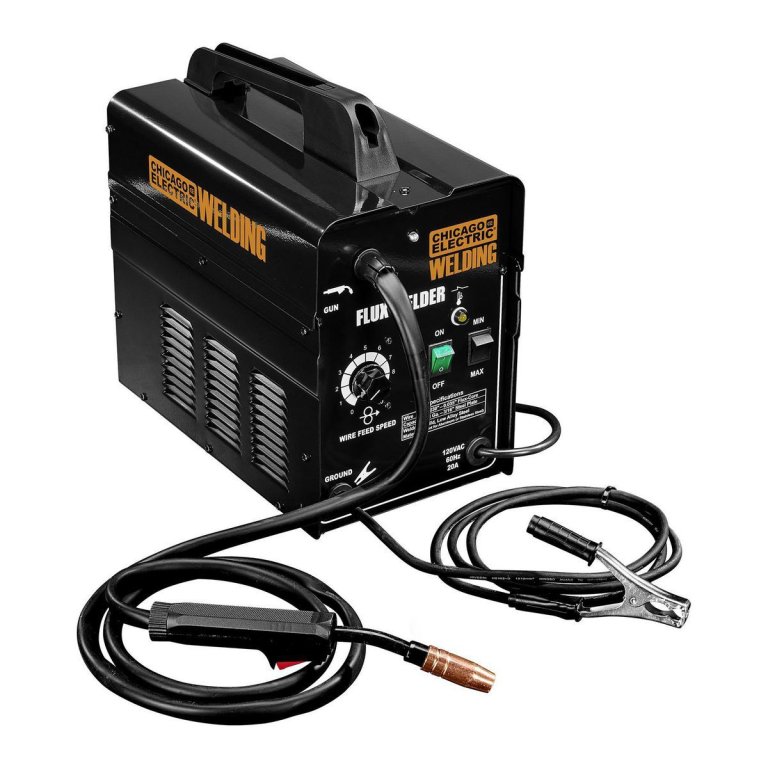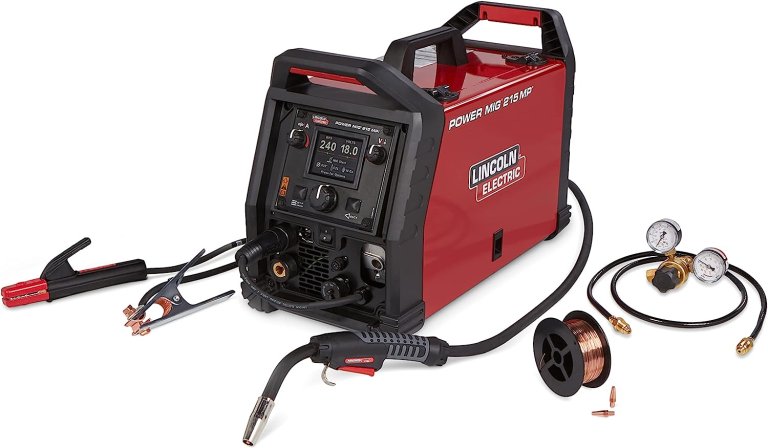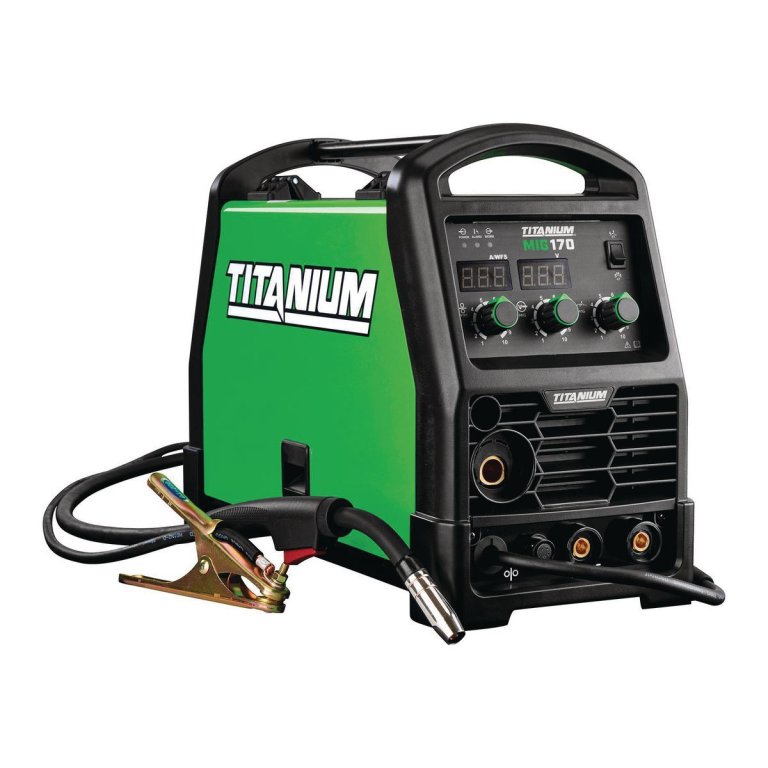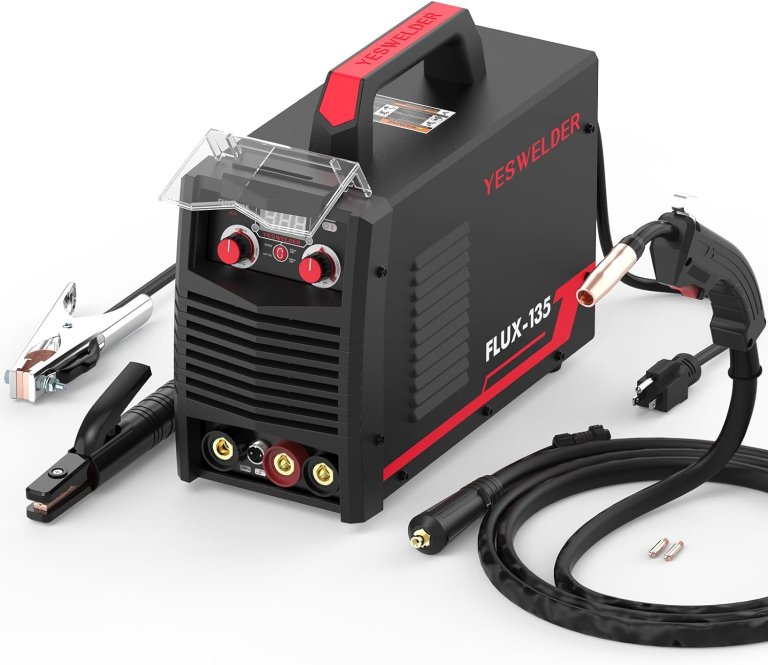We may earn revenue from the products available on this page and participate in affiliate programs. Learn more ›

The ability to weld is what takes your average shadetree mechanic to the esteemed rank of fabricator. For some, it isn’t just a lack of knowledge holding them back from living out their MacGyver dreams, but that initial investment in equipment can seem pretty steep.
A welding machine for home use isn’t the same as what you would use in a shop. If your machine is paying the bills, you need something with a minimum 70% duty cycle, which means it has the ability to weld 7 out of every 10 minutes of operation. At home, you can really get away with a 20% duty cycle. A shop machine will generally run on 240V with the larger industrial machines requiring a 3-phase outlet. The smaller at-home machines will run fine on 120V and the larger home machines will run on 240V single phase or be switchable between the two.
While you should still do some real research before pulling the trigger on a machine, you’ll find I did and pulled the best welders around so it makes your life easier.
Summary List
- Best Overall: Eastwood MP250i Elite Multi-Purpose
- Best Value: Chicago Electric Flux 125
- Best Premium: Lincoln Electric Power MIG 215 MPi
- Honorable Mention: Titanium MIG 170
- Honorable Mention: YESWELDER 135Amp MIG Welder
Our Methodology
I can hustle a car around a racetrack with the best of them. I can smoke a heck of a pork shoulder and have a pretty good handle on multiple pieces of coffee-making equipment. I’ve been a literal rocket scientist and I’ve worked in engineering for a car company. I’m a machinist, a taco enthusiast, and a cyclist, but in no way at all, do I consider myself a welder, much less an expert. I am very good at research, however. This guide is based on hours of research and just enough experience with welding in the past to understand the terminology, mechanics, and science of welding.
I also leaned on our own Hank O’Hop, who is our resident old car wrangler. His input has been invaluable, and you can even find a link to his experiences in the write-up of the Harbor Freight Welder below. This guide is largely aimed at novice welders working at home. The welder machines here cover a large range of abilities and performance specs. New welders hit the market on a regular basis, and while the technology hasn’t changed all that much in a few decades, the competition for features per dollar is ongoing. This is a living document and will be updated every few months, so what is best today, may not be tomorrow. I reserve the right to completely change my mind in the future.
Best Welders: Reviews & Recommendations
Best Overall: Eastwood MP250i Elite Multi-Purpose
Pros
- Includes everything you need for MIG and TIG besides gas and wire
- It will run on either 120 or 240 so it works in home shops
- This will do mild steel, stainless, and aluminum(MIG only)
Cons
- It weighs about 100 pounds, so it isn’t really portable
- You may not be able to get this serviced locally if it needs it
Right off the bat, I need to point out is this is the updated version of the MP250i. There was an older version which apparently had a couple of issues, as well as not including everything you needed for TIG. These things have been remedied and you now get all the hardware you need for MIG, TIG, and Arc welding. The machine can be adjusted between 15 and 250 Amps to allow welding anything from thin gauge sheet metal up to ½ inch. And, like more expensive machines, this has a square wave converter, which makes for more consistent welds.
Tanks are not included, but it has both regulators and the space for two bottles for both the CO2 and Argon necessary for both MIG and TIG. The MIG torch is on a 15-foot lead, which uses a dual-wheel drive system to push the wire, and a 12-foot lead for the TIG torch, Eastwood hasn’t said how many wheels it uses to push the electrons through. The foot pedal for the TIG has a 16-foot lead, I know there’s a joke about TIG welders laying down on the job or something; if you figure it out, leave it in the comments.
Some of you are thinking that this machine is getting pretty close in price to either a Lincoln or a Miller with the same specs. And it looks that way until you figure those machines usually don’t include the TIG kit or even a cart. So, this machine is a relative bargain for people who are committed to welding. Obviously, if you are buying this to save yourself a couple hundred bucks on a project or two, this isn’t for you. But, if you already have some welding experience, or you are committed to learning to weld, you won’t have the need to upgrade this machine for years.
Best Value: Chicago Electric Flux 125
Pros
- Start welding for a little more than the price of filling up your gas tank
- Weld 18ga(.050u0022) up to 3/16(.1875)u0022 steel
- Overload protection built in with a 20% duty cycle at 90 Amps
Cons
- Flux Core only, no option for shield gas
- This is as basic as it gets and if you’re serious about becoming a proficient welder, you will outgrow its abilities
Our own Hank O’Hop has been using one of these welders for the better part of a year and you can read his full review here. But, let me sum up Hank’s thoughts, “it’s cheap and it works.” That isn’t all that informative if you’re trying to decide if this welder is right for your situation, so let me expand as if you aren’t into the whole brevity thing, man.
This is a compact little welder, it weighs under 40 pounds and is roughly 14 x 14 x 8 inches. It’s simple to operate, a single switch for either 60 or 125 Amps, and a 10-position dial for wire speed. It does Flux core wire feed only, so there is no provision for using gas. It’s rated between 18 gauge and 3/16 inch mild steel, which is usually plenty of flexibility for car work.
Hank has really given his Flux 125 a proper workout and while some of his welds look like well-chewed Bazooka gum, he made two pieces of metal into one. He also discovered what every welder knows, a few minutes with a grinder is an easy way to hide your crimes. If you know from the beginning what you’re getting into with this welder, and you appreciate the fact you’re buying the ability to fuse metal and not make art, then you won’t be disappointed.
Best Premium: Lincoln Electric Power MIG 215 MPi
Pros
- Typical Lincoln Electric quality and servicability
- Does MIG, TIG, Flux, Arc, Steel, Stainless, Aluminum(MIG)
- A big boy welder in a small package
Cons
- You could buy half of Harbor Freight for the price of this
- It includes enough stuff to get you going on MIG
If you are familiar with welding then you’re familiar with Lincoln Electric’s reputation. You will find red boxes of all sizes everywhere from fabrication shops to the highest level racing enterprises. This particular unit is of pro-level quality has a 60% duty cycle and would work fine for a shop whose main focus isn’t constant welding. It will also make a fantastic, if expensive, addition to your home shop.
This probably isn’t going to be most people’s first welder, but may well be the last one they need to buy. It’ll run on 120 or 240V while being adjustable between 20 – 220 Amps. But, unlike most welders, that adjustment is just the start. The tunability of this machine can be intimidating for beginners. Things like gas pre- and post-flow, feed run-in, and hot-starting are all adjustments most novices won’t know what to do with. Luckily, Lincoln Electric has some of the best customer service in the industry. This also brings us to servicing, which if required, can usually be performed locally by an authorized servicer.
If you have the money, this is the type of welder you want to buy. Lincoln machines are aspirational pieces of equipment for many people who use them for a living. It’s a long-term purchase, so for some, it will be worth it.
Honorable Mention: Titanium MIG 170
Pros
- Mid-priced home MIG/Flux machine makes a greater starter with room to grow
- 120 and 240V, 30 – 170Amps with a 25% Duty Cycle
- Truly portable unit at 21-in. long and 24 pounds
Cons
- In hard use, the rated Duty Cycle might be optimistic
- Thin sheet metal will take extra skill to not end up looking at a puddle through a big hole
This may not occupy our best overall spot, but that doesn’t mean it isn’t a strong choice. If you are looking for a first MIG machine or have some experience and want a compact but capable machine at an attractive price, this might be your dream machine.
This will do both MIG and Flux, mild steel, stainless, and aluminum. The specs say it will work on 24ga up to ⅜ inch, you may want to stay away from the extremes of the scale until you have some skills. You can plug this into either 120 or 240V and has controls for wire speed, amperage, and inductance. This is a pretty easy machine to dial in but still offers flexibility. This machine is a bargain compared to the bigger names out there. The warranty is only 90 days, but many users report several years of dependable service.
Honorable Mention: YESWELDER 135Amp MIG Welder
Pros
- The price is nearly too good to be true
- MIG and Flux out of the box with TIG upgrades possible
- 120V, 20 – 135Amps with an undetermined Duty Cycle
Cons
- Will do MIG but doesn’t include pressure regulator
- Can you believe the price
- Some of the adjustments are not independent of each other
I will start right out by saying, I have never even seen this welder in the flesh, much less, used one. One of the other publications in our media group has had the opportunity to hands-on test YESWELDERS and they were impressed, especially considering the price is competitive with the Chicago Electric Flux-only unit above.
This is 120V only and has a maximum rating of 135 Amps. It is rated for mild steel up to 5/32 inch, which admittedly isn’t real thick, but probably enough for most people. The voltage, wire speed, and amperage are all adjusted simultaneously, which the company claims is a feature that makes it easier for beginners. I’m not sure about that, but at least it has adjustability.
The machine itself is the picture of portability. It’s just 18 x 13 x 11 inches and weighs just under 12 pounds. It includes a MIG gun with 8-foot lead, a ground clamp with 10-foot lead, and a clamp for stick, also with a 10-foot lead. Every professional review I can find online, including some dedicated welding sites, are impressed with the performance. Although none of them can give praise, without mentioning the price in the same sentence. I am intrigued for the price.
Our Verdict
The variety of welders on the market is huge, but we narrowed it down to this concise list. Our best overall comes from a company dedicated to automotive restoration, and we feel the Eastwood MP250i Elite Multi-Purpose will make many garages and workshops happier places. If you are looking for a value proposition either to get started or to use occasionally, it will be hard to beat the Chicago Electric Flux 125.
FAQs
You’ve got questions, The Drive has answers.
What determines the size of welder is the Amps it can deliver. For home use, you want something between 100 and 200 Amps, depending on what you intend to weld.
To get the best results, you want to use a shielding gas. So if your budget allows for either a MIG or TIG machine, that would be ideal.
Most small welders are capable of running on a standard 120V outlet, like you find anywhere in your home. Some units will work best on a 240V outlet, like your clothes dryer uses. If you are buying a 240V machine, make sure it works on single phase.
Flux core welding can produce great results with practice and patience. You will get more welding spatter and the bead might require some clean up, but it is still very usable.
